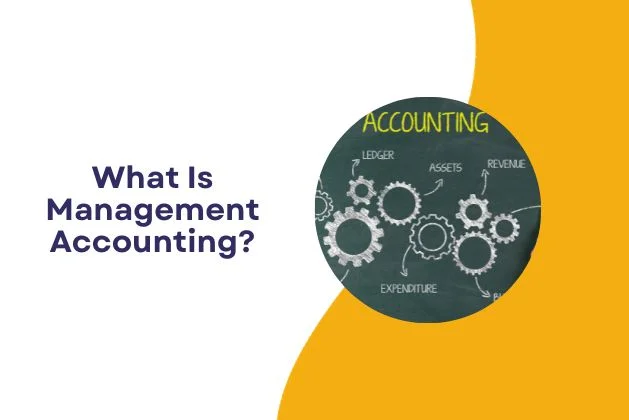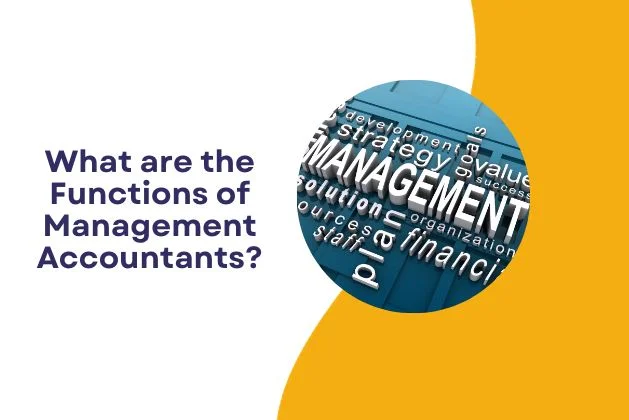Table of Contents
ToggleIntroduction
The Functions of management accountant is an incredibly important branch of accounting which focuses on providing information to internal decision-makers within a business. This differs from other branches of accounting which are more concerned with reporting financial outcomes to external stakeholders such as banks and shareholders. As a result, management accounting takes on a strategic role in businesses, as it provides comprehensive financial analysis which can be used to inform decisions and ensure long-term success. Let us take an in-depth look at the functions, job roles, qualifications and skills needed for management accountants.
What Is Management Accounting?

Management accounting involves a combination of disciplines, including accounting, finance, and management. It seeks to leverage the most effective strategies to ensure business success.
This can be a very rewarding career path for those with the right skillset and mindset; it requires a robust comprehension of mathematics as well as an ability to discern patterns in data and use past trends to make accurate predictions about future events that could influence business decisions.
In this way, management accountants need to have a strong grasp on macro-level developments in order to anticipate the impacts they might have on their organization’s operations. Therefore, it is essential that those pursuing this profession stay attuned to current news and changes in global markets in order to stay informed about industry developments.
Who Are Management Accountants?

Functions of Management accountant play an integral role in the decision-making process of any organization. They are tasked with the responsibility of ensuring that the decisions made by businesses are based on accurate and well-researched information.
To achieve this, management accountants provide financial analysis of management information through the preparation, development, and examination of financial data.
This detailed analysis then enables organizations to make informed strategic and operational decisions with confidence in their accuracy and effectiveness.
Read About: CFA Course Fees India
What are the Functions of Management Accountants?

Functions of Management accountant are responsible for performing a variety of functions, all of which are determined by their job positions, the agreements made with the organization they work for, and their own personal skill sets and knowledge.
In short, these responsibilities include but are not limited to drafting financial statements, creating budgeting plans and reports, analyzing financial data to identify areas of cost savings or profit gain, developing and executing strategies to maximize profits, providing advice on taxation matters, and ensuring compliance with applicable laws.
Furthermore, management accountants may also be tasked with overseeing the payroll process as well as providing training to other employees in the organization on various accounting topics. As such, management accountants play a critical role in helping businesses achieve their financial goals.
Planning and Accounting Functions Of Management Accountant
Management accountants are responsible for the creation and maintenance of an extensive accounting system encompassing all aspects of the budgeting process. This includes cost analysis, sales forecasting, profit projection, production planning and resource allocation.
They also devise plans for capital expenditures and develop both short-term and long-term financial strategies. To ensure the successful implementation of these plans, management accountants write out detailed procedures to be followed by relevant personnel within the organization.
Controlling Functions Of Management Accountant
Management accountants play an essential role in overseeing and controlling the performance of an organization, by utilizing standard costing, developing and analyzing various financial ratios.
Through these methods, management accountants are able to analyze the organization’s finances and create strategies that can help the organization reach their goals. Additionally, they are also responsible for producing reports that provide insight into the financial health of the organization.
This enables them to make recommendations to upper management on potential improvements which can lead to increased efficiency and profitability.
Reporting Functions Of Management Accountant
Functions Of Management Accountant play an essential role in helping the top management understand the underlying cause of any unfavorable operations or events that have occurred.
They are responsible for thoroughly analyzing the situation and identifying the real reasons behind the adverse events, as well as pinpointing who is responsible for them.
Once all of this information has been collected, they will then provide a comprehensive report to the top management outlining their findings. This report can then be used to make informed decisions about how to best move forward.
Coordinating Functions Of Management Accountant
Functions Of Management Accountant are instrumental in improving an organization’s efficiency and profits, by providing the leadership with various coordination tools such as budgeting, financial reporting, financial analysis and interpretation.
These tools are essential for assessing the organization’s performance, by comparing cost and financial records against predetermined parameters, preparing financial budgets and establishing standard costs on a periodic basis.
Through such processes, management is enabled to take corrective action as needed when cost deviations occur; this approach known as ‘management by exception’ has become increasingly popular in modern businesses.
Communication Functions Of Management Accountant
Functions Of Management Accountant are integral to the success of a company, as they create and maintain a wide range of reports that provide invaluable information to both internal stakeholders and external audiences.
These reports serve multiple purposes, including communicating financial results to superiors, motivating staff, exercising effective control over operations, and providing management with data-driven insights for making informed decisions.
Moreover, through published financial statements and returns, they ensure outside parties have access to the relevant data necessary for assessing the company’s performance.
Financial evaluation and Interpretation Functions Of Management Accountant
Functions Of Management Accountant are responsible for collecting, interpreting, and analyzing financial data in order to provide the senior management team and shareholders with a clear and concise report that can be used to make informed decisions.
They also offer their own comments and ideas based on their analysis of the data, presented in an easily digestible format that avoids technical jargon. This allows all stakeholders to have an accurate understanding of the financial health of the organization and make informed decisions based on this data.
Tax Administration Functions Of Management Accountant
Functions Of Management Accountant are responsible for overseeing all aspects of a company’s tax policies and processes. This includes ensuring that the necessary reports are produced and submitted to the relevant authorities in a timely manner.
They must also set aside sufficient tax provisions to ensure that quarterly tax payments are made in advance according to the Income Tax Act, so as to avoid any late payment penalties which could incur interest charges.
Evaluation of External Effects Functions Of Management Accountant
The government can often update existing policies or legislation that can potentially have an effect on a business’s objectives.
In order to assess the magnitude of this impact, management accountants take it upon themselves to review and analyze the external forces at play and then inform the relevant stakeholders of any necessary adjustments that need to be made in order to mitigate any potential risks.
This is all done with the goal of safeguarding both short-term and long-term business goals.
Economic appraisal Functions Of Management Accountant
When the government releases regular updates on the nation’s economic outlook, Functions Of Management Accountant conduct an in-depth study of the current economic environment and examine how it may directly affect the operations of their company.
After carefully analyzing all relevant data, they compile a comprehensive report of their findings and conclusions, which is then presented to top-level management for review. This report can help guide decision makers in making informed decisions that will ensure the long-term success of the organization.
Asset Protection Functions Of Management Accountant
Management accountants are responsible for maintaining comprehensive fixed asset registers, which record details such as the date of purchase, cost, and depreciation values of each and every asset.
This process serves to provide internal checks and controls, ensuring that company assets are adequately safeguarded.
Additionally, they must create the necessary rules and regulations governing the acquisition and disposal of fixed assets; this includes obtaining appropriate insurance coverage for all types of fixed assets to further protect against any potential financial losses.
What Are The Roles Of Management Accountants?

The management accounting role is expansive and far-reaching, encompassing the identification and management of risk, analysis of information, and utilization of the data to make informed business decisions, plans, and budgets.
The roles of Functions Of Management Accountant are multifaceted: to consult with the various segments of management responsible for policies and procedures to assess their efficiency; to make comparisons between the operational plan and standards and report on any discrepancies .
To all levels of management as well as business owners; to establish, coordinate, and execute an efficient plan for operation and control that encompasses cost standards such as spending budgets, profit planning, sales forecasts, capital investments, financing programs and procedures necessary for its successful execution; lastly, to ensure the security of company assets through sound internal controls as well as adequate insurance coverages.
Read About: How to Value A Business
The Job Roles Performed By Management Accountants Are As Follows:
Staff accountant Functions Of Management Accountant
The position of staff accountant is an important role within any accounting team. They are responsible for performing a wide range of accounting tasks such as reviewing accounts, reconciling bank statements, creating journal entries, maintaining the general ledger, and producing financial statements.
Furthermore, staff accountants may be required to assist with basic cost accounting procedures and help test internal controls. Fortunately no prior experience is necessary to excel in this role; however, a strong aptitude for numbers and an understanding of accounting principles is beneficial.
Financial Analysts Functions Of Management Accountant
Financial analysts are responsible for providing critical support to their director or manager, often utilizing advanced financial modeling techniques to develop comprehensive budgets and forecasts. They must also be able to monitor results and analyze any differences between the actual and projected outcomes, as well as generate relevant supporting documents. This role typically requires at least one to three years of experience demonstrating a solid understanding of financial concepts.
Accounting Manager Functions Of Management Accountant
Accounting managers play a crucial role in overseeing the monthly financial closers and managing general ledger accounting. Additionally, many accounting managers also serve as liaisons with external auditors, ensuring that internal accounting practices are up-to-date and compliant with all regulatory requirements. The years of experience required for this position can vary depending on the organization, but typically range from five to ten years of relevant experience in the field of accounting.
Manager/Director data analytics Functions Of Management Accountant
This position requires an extensive knowledge of statistics, data science, and data visualization, as well as over five years of relevant work experience. The role involves taking raw data and conducting comprehensive analyses to discover trends and insights that can help guide business decisions. This might include examining customer behavior or sales performance to identify new opportunities or strategies for improvement. The successful candidate must also have the ability to explain their findings in an understandable and actionable way in order to make them useful for the decision makers.
Manager/Director – strategic planning Functions Of Management Accountant
This role, critical to the success of the organisation, reports directly to either the chief executive officer (CEO) or chief financial officer (CFO). The individual is responsible for devising comprehensive growth strategies for all products and services, taking into account the external environment which may provide potential organic growth opportunities. This requires a high degree of expertise in analysing these external factors and strategically identifying how to leverage them to take advantage of potential mergers & acquisitions (M&A) opportunities. To be successful in this role it is essential that the individual has at least five years of applicable experience.
Vice President – Financial Planning and Analysis Functions Of Management Accountant
The Vice President of Financial Planning and Analysis has an essential role within the company, with a team of financial analysts and managers under them that report directly to the Chief Financial Officer (CFO). This individual is responsible for creating and executing corporate strategies that focus on ensuring profitability and controlling costs, while making sure that strategic priorities are included in the planning process. With over 10 years of experience required, the VP of FP&A is also tasked with conducting an analysis of business cases in order to develop new markets, products, and services for the company. They play a critical part in assessing any potential risks or opportunities that may arise while calculating accurate forecasts for future investments. Furthermore, they are responsible for producing reports that outline current financial performance while providing guidance on future decisions based on their research and insights.
Treasurer Functions Of Management Accountant
The Treasurer is a critical role responsible for managing all cash operations, accurately predicting future cash flow needs, and maintaining strong relationships with lenders. They are typically tasked with developing sophisticated finance and hedging strategies and leading communications with rating agencies and investors. Reporting directly to the CFO, they must possess at least ten years of experience in order to be considered for the position.
Controller Functions Of Management Accountant
This highly sought after senior-level leadership role reports directly to the Chief Executive Officer (CEO) or Chief Financial Officer (CFO). As Controller, you will be responsible for managing and overseeing all financial reporting and accounting operations. This includes preparing and maintaining internal and external financial statements in accordance with all applicable regulations, providing regular reports on financial performance metrics, implementing strong internal controls systems to ensure accuracy of financial records, and evaluating the effectiveness of the accounting system. Depending on the organization, the ideal candidate for this position typically has several years of relevant experience.
CFO Functions Of Management Accountant
The Chief Financial Officer (CFO) plays a major role in a company’s senior leadership team, acting as a key advisor for the CEO and providing guidance in all financial matters. The CFO has a number of responsibilities, including overseeing capital requirements for the business, structuring corporate financing, managing relations with investors and lenders, evaluating mergers and acquisitions opportunities, and dealing with external parties such as regulators and journalists. In addition to these duties, the CFO is also responsible for financial reporting and accounting operations.
Depending on the size of the company, they may also have additional functions such as IT, Human Resources, or Facility Management. The CFO is usually supported by a controller who assists in their day-to-day tasks; however experience level for this position can vary greatly from one company to another.
How To Become A Management Accountant?
For those who aspire to pursue a career in Functions Of Management Accountant , it is advisable to get an early start. It is important to read widely across trade and national publications, as this can help build a foundation of knowledge. Additionally, having experience in the financial or business sector is beneficial for demonstrating capability and willingness to learn. Even without such experience, it is still possible to acquire relevant workplace skills from any role; such skills may include the ability to utilize data for problem solving purposes, make accurate predictions, and be able to adapt quickly when faced with changes within an organization.
Education And Experience
Functions Of Management Accountant is an attractive career option for both university graduates and school leavers. For university graduates, any degree is acceptable though those who have studied accountancy, mathematics, management or business will be at an advantage as they may be able to skip some of the required tests.
However, for those looking to join top organizations, a bachelor’s degree is usually expected along with two years of experience in management accounting. For those who don’t have the necessary background or qualifications, earning certifications is a great way to gain new skills and competencies in order to make up for any shortfall.
Skills of Management Accountants

Commercial Awareness
Having a fundamental comprehension of the business and its mechanisms is an essential skill for professionals working in any industry. They should be well-versed in how the business operates, both internally and externally, as well as being aware of how external factors can affect it. Additionally, understanding the key business drivers that are unique to their company can help to inform decisions and give them a better overall picture of their organization’s operations.
Keep up with technology
With the continued adoption of technology across virtually all industries, management accountants must stay abreast of the most recent developments and be well-versed in utilizing these tools to their organization’s advantage. Technology is rapidly transforming the field of Functions Of Management Accountant , with a high priority placed on having an in-depth understanding of the latest technological advancements and solutions. In order to remain competitive and gain a strategic edge within their respective fields, management accountants must be knowledgeable and proficient in leveraging technological resources to their fullest potential.
Collaboration
As Functions Of Management Accountant professionals, it is essential for us to demonstrate our ability to collaborate effectively with both colleagues within the department and those outside it. It is important to gain the respect and trust of our peers through showing genuine interest in their lives and work, as well as a commitment to the company’s collective success rather than focusing solely on number-crunching. This will give colleagues confidence in our capabilities and allow us to be better contributors to the organization.
Delivery of information
Functions Of Management Accountant must have the capacity to rapidly acquire and assess data, comprehending the significance of this information and how it should be communicated to the target audience. This is especially crucial when delivering reports to upper management and those who don’t possess a financial background. It is essential for management accountants to summarize the main points of data in an understandable way, elucidating their implications, and responding to any queries that may arise during the presentation. Finding a balance between these elements is paramount in order to ensure effective communication.
Set an example
The courses in finance and related disciplines offer a comprehensive education on the importance of ethics, integrity and transparency, however, it is up to management accountants to put these principles into practice. They should strive to lead by example and do their utmost to ensure that everyone in the organization is familiar with the financial procedures and controls that maintain ethical standards. Additionally, management accountants should be aware of and adhere to all internal human resources guidelines and codes, which can be a key factor in their success as they strive for leadership and management roles within the company.
Conclusion
As technology continues to evolve, management accountants are being tasked with adapting to their changing roles and responsibilities in order to effectively guide their organization’s strategy and planning. This is especially true for those who have recently graduated, as they may very well find themselves in positions that don’t even exist yet in a world that is constantly shifting. Nonetheless, management accounting can provide a wealth of opportunities now and in the future for those looking to develop their careers, whether they are just getting started or striving to reach the highest levels of success within an organization.
Frequently Asked Questions (FAQs)
A functions of management accountant role is to provide financial and non-financial information to help management make informed decisions and achieve the organization’s goals. Th ey analyze data, create reports, and offer insights into the financial health and performance of the company.
Financial accountants focus on external financial reporting, ensuring that financial statements comply with accounting standards and regulations. Management accountants, on the other hand, primarily serve internal management by providing information for decision-making and planning.
Management accountants prepare various reports, including budgets, forecasts, cost reports, variance analyses, and performance reports. These reports help management understand and control costs, set financial goals, and measure performance against objectives.
Management accountants analyze costs within the organization, identify areas of inefficiency, and suggest cost-cutting measures. They may also develop cost accounting systems to track and control costs more effectively.
Budgeting is the process of setting financial goals and creating a plan to achieve them. Management accountants play a central role in budgeting by developing budgets, monitoring actual performance against budgeted figures, and making adjustments as necessary to ensure financial goals are met.
Management accountants provide financial analysis and data that help management formulate strategic plans. They assess the financial implications of various strategic options and assist in making decisions that align with the organization’s long-term objectives.
Management accountants design performance metrics and key performance indicators (KPIs) to evaluate the effectiveness of various aspects of the organization. They track and report on these metrics to help management gauge performance and make necessary improvements.
Yes, management accountants can assist in identifying and assessing financial risks. They may conduct risk analysis, develop risk mitigation strategies, and provide information to management for informed risk-related decisions.
Many management accountants pursue certifications such as the Certified Management Accountant (CMA) to demonstrate their expertise and commitment to their profession. While certification is not always required, it can enhance career opportunities and professional credibility.



